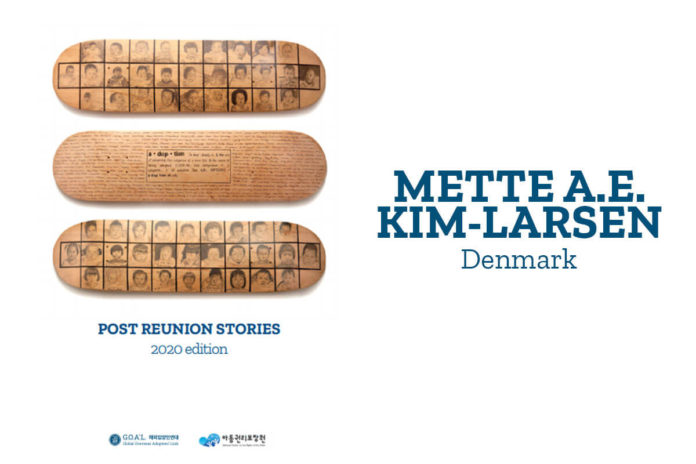Story by Mette A. E. Kim-Larsen
Bio
Mette A. E. Kim-Larsen was born in 1984 in Daegu and adopted to the Northern part of
Denmark as a 3 month old baby. She grew up in a small town community with a mother who worked as a teacher, a father who was a Senior Sergeant in the Danish air force, and a younger brother who is also adopted from Korea. Kim-Larsen holds a BA in Comparative Literature and an MA in Critical Theory from the Copenhagen University, Denmark and is currently an MA-student at Columbia University, US. She went back to Korea the first time in the summer of 2013 where she reunited with her parents, and in 2019, during her third visit, she reunited with her two younger siblings.
—
Last year, around this time in August, my dad knocked on the door to the room I was
staying in at my parents’ place in Daegu. He had to go on a business trip, even though he had retired six month prior, and I would need to head back to Seoul immediately. Disappointed that I would miss out on my last days in the city, I let him know that I would find another place I could stay till Friday to which my dad gave me a disapproving look when he left, only to return half an hour later to announce that my brother would be visiting us today and that I could stay. I knew about my brother and my sister from the updates my dad had given me over the years, but I had never met them. After my dad left the apartment, I spent hours staring out the window. The wind made the trees sway in unison, held together softly by their roots to the mountain side. In the Silla annals, a crowing white rooster in the woods leads Ho-gong, a retainer of King Talhae of Silla, to a golden chest in which Alchi is found.
The King is captivated by Alchi’s exceptional features and decides to take him in, and Alchi
later becomes the progenitor of the Kim-clan. When I first met my mom at the agency seven
years ago, my family name Kim was the only correct information given on my parents in my
files. It was afternoon when the main door finally opened and my dad entered with Yongka. I
had expected that my dad would have prepared him during the car ride but Yongka looked
with surprise at me, a female version of my dad, whom he had never seen before. I was
merely a blank space in our family’s Jokbo up until we stood in the living room inspecting
each other, while my dad introduced me as the eldest sister. Before his unexpected visit,
Yongka had a big tattoo made on his lower arm that had him fear for my dad’s reaction, but
the disgrace of Yongka getting inked faded in comparison to my dad keeping me a secret so
my dad could do nothing but just ignore it.
I later met Heekyung for the first time at a cafe in Seoul, where we mostly cried while
sometimes sipping our tea. I used to imagine that I had an older sister. She came in different
versions over the years, taking shape after whatever occupied my time. One would be good
at handball and teach me tricks, while another would write my assignments in math when I
started failing my tests. We were generally the same size so I could steal their clothes, and we had a shared interest for poetry. When your family history is a mystery, it is easy to fill out
the missing holes yourself, either by imagination or by real people. When I was in my late
twenties, I moved in with a girlfriend in Paris, who was also a Korean adoptee. She
introduced me to George Perros and the tv show My Love from the Stars, and we would ride
on the same ticket in the subway, as our two bodies sandwiched together in the turnstyle
would pass for one. We remained friends for some years, after I left France, but when I
started dating my ex, she stopped contacting me, and I never got over it. Heekyung is
a couple of inches shorter than me. She coordinates her outfits at all times like my mom and
myself, and she works as an interior designer because she is sensitive to ugly surroundings,
also like my mom and me. Growing up, my sister was well-behaved, and she excelled in
school. She attended an art school in Providence where I stopped by recently on my way
home to New York because I wanted to get a glimpse of her past life. In a few hours the city
scooter took me from the train station to Fleet Library, and then to her school, before I
returned it at her favourite coffee place on Wickenden Street. I wanted to taste the coffee she liked and see what type of people she felt comfortable being around but the place was closed because of the pandemic. Contrary to Yongka, she knew about my existence, as my mom had given hints about me over the years. Maybe it is less easy to keep a child a secret if your body was the one giving birth to it. When I came out, I had a cleft lip and palate which made the different parts of my lips rise from my face in small boulders turning my mouth into a brook from where saliva would run sideways slowly overflowing the arms of everybody who cradled me. Being only a few minutes old it had already become my life’s orientation device as my dad’s oldest sister decided that I should be given up for adoption, and I was thus passed on to a new family.
Literature
“The Indigenous Religions of Silla: Their Diversity and Durability” – Kidong Lee P. 59 (Samguk Sagi, 7)












